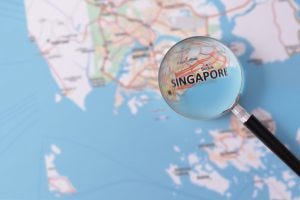Tessa Therapeutics will open a plant in Singapore for its CAR-T programs, while CellVec has opened a viral vector facility on the island state to support customers’ gene therapy projects.
Singapore-based biotech Tessa is developing its own autologous cellular therapies and has told us it plans to open a 90,000 square-foot plant to support clinical and commercial efforts.
“Tessa will use the new facility for the clinical and future commercial manufacturing of our late-stage clinical programs,” the firm said, adding the plant will “enable Tessa to advance our CMC (Chemistry, Manufacturing and Controls) development efforts, from early phase clinical development through to commercialization, and for potential BLA submissions.”

Image: iStock/Davizro
Tessa’s programs include a Phase II pivotal clinical trial for a Chimeric Antigen Receptor T-cell (CAR-T) therapy targeting relapsed or refractory classical Hodgkin Lymphoma and a Phase III clinical trial for a Virus-Specific T-cell (VST) therapy targeting nasopharyngeal cancer.
The facility, set to open later this year, is expected to be able to supply about 3,000 patients annually and will allow Tessa to have control over its own processes and supply chain.
“Building up in-house capabilities will enable Tessa to retain our cell therapy manufacturing know-how and gain better control over the complex operations and processes involved in manufacturing and vein-to-vein supply chain logistics of personalized cell therapies,” the firm told Bioprocess Insider.
“An in-house facility will also add agility to our manufacturing approach, enhance our manufacturing response time in accordance to our clinical development strategy and optimize speed-to-market when we enter into the commercialization phase.”
Tessa is not currently using a contract development and manufacturing organization (CDMO), we were told.
Singapore
The South-East Asian outpost has been a hub for biomanufacturing for decades, and continues to attract investment. GSK and Amgen have recently opened next-generation facilities on the island state, while CDMOs including Lonza and WuXi Biologics have invested in Singapore.
“Singapore has a ready pool of biopharmaceutical talent that we can tap on for our manufacturing operations once the new facility is operational,” Tessa said.
“The country is also an emerging regional hub for biomedical innovation and commercialization with world-class logistics, and IP protection expertise – all of which are important factors that will help us achieve a market leadership position in the cell therapy space.”
Backing this up, gene therapy CDMO CellVec has just opened a GMP facility dedicated to viral vector manufacturing in the region.
According to co-founder and CSO Lucas Chan on Linkedin, CellVec’s “manufacturing process for lentiviral vectors support up to pivotal phase clinical development and is compliant to EU / US FDA GMP requirements.” He added the firm is “open to enquiries regarding manufacturing slots.”

schedl_b_and_w.jpg?width=100&auto=webp&quality=80&disable=upscale)


schedl_b_and_w.jpg?width=400&auto=webp&quality=80&disable=upscale)


